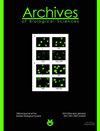Protective effects of pumpkin (Cucurbita pepo L.) seed oil on rat liver damage induced by chronic alcohol consumption
IF 0.8
4区 生物学
Q4 BIOLOGY
引用次数: 4
Abstract
Pumpkin seed oil (PSO) possesses a protective potential against liver injury due to the presence of biologically active ingredients. Adult male albino rats were administrated PSO (per os, 2 mL/kg b.w./day) and a 12% ethanol solution in water, ad libitum, with an average intake of 8.14 g of ethanol/kg bw/day for 6 weeks. Congestion, hepatic central vein dilation, portal vein branch dilation, Kupffer cell hyperplasia, fatty liver changes, hepatocyte focal necrosis were observed after daily alcohol intake. All observed changes were reduced when PSO was ingested with ethanol. PSO intake itself induced discrete cellular edema, congestion and slight dilatation of the central and portal vain branches. Chronic ethanol intake elevated catalase (CAT) activity and glutathione reductase (GR) protein expression; concomitant PSO intake had no effect on CAT activity or GR protein expression. PSO intake decreased the activities of GR, glutathione-S-transferase (GST) and xanthine oxidase (XOD) in the liver, probably due to the ingestion of antioxidants. Intake of PSO and ethanol significantly decreased cytosolic superoxide dismutase (SOD1) and increased NF-?B protein expression compared to ethanol intake, suggesting that the protective effects of PSO were mediated by the NF-?B signaling pathway. Our results reveal a therapeutic potential of PSO in alcoholic liver disease.南瓜籽油对慢性酒精所致大鼠肝损伤的保护作用
南瓜籽油(PSO)由于其生物活性成分的存在而具有抗肝损伤的保护潜力。成年雄性白化大鼠给予PSO(每只,2 mL/kg体重/天)和12%乙醇水溶液,随机饲喂,平均摄入量为8.14 g /kg体重/天,连续6周。每日饮酒后观察充血、肝中央静脉扩张、门静脉分支扩张、库普弗细胞增生、脂肪肝改变、肝细胞局灶性坏死。当PSO与乙醇一起摄入时,所有观察到的变化都减少了。PSO摄入本身诱导离散细胞水肿,充血和轻微扩张的中央和门静脉分支。慢性乙醇摄入增加过氧化氢酶(CAT)活性和谷胱甘肽还原酶(GR)蛋白表达;同时摄入PSO对CAT活性和GR蛋白表达没有影响。PSO的摄入降低了肝脏GR、谷胱甘肽- s转移酶(GST)和黄嘌呤氧化酶(XOD)的活性,这可能与摄入抗氧化剂有关。PSO和乙醇的摄入显著降低了胞浆超氧化物歧化酶(SOD1),增加了NF-?B蛋白表达与乙醇摄入相比,提示PSO的保护作用是由NF-?B信号通路。我们的结果揭示了PSO在酒精性肝病中的治疗潜力。
本文章由计算机程序翻译,如有差异,请以英文原文为准。
求助全文
约1分钟内获得全文
求助全文
来源期刊
CiteScore
1.40
自引率
0.00%
发文量
25
审稿时长
3-8 weeks
期刊介绍:
The Archives of Biological Sciences is a multidisciplinary journal that covers original research in a wide range of subjects in life science, including biology, ecology, human biology and biomedical research.
The Archives of Biological Sciences features articles in genetics, botany and zoology (including higher and lower terrestrial and aquatic plants and animals, prokaryote biology, algology, mycology, entomology, etc.); biological systematics; evolution; biochemistry, molecular and cell biology, including all aspects of normal cell functioning, from embryonic to differentiated tissues and in different pathological states; physiology, including chronobiology, thermal biology, cryobiology; radiobiology; neurobiology; immunology, including human immunology; human biology, including the biological basis of specific human pathologies and disease management.

 求助内容:
求助内容: 应助结果提醒方式:
应助结果提醒方式:


